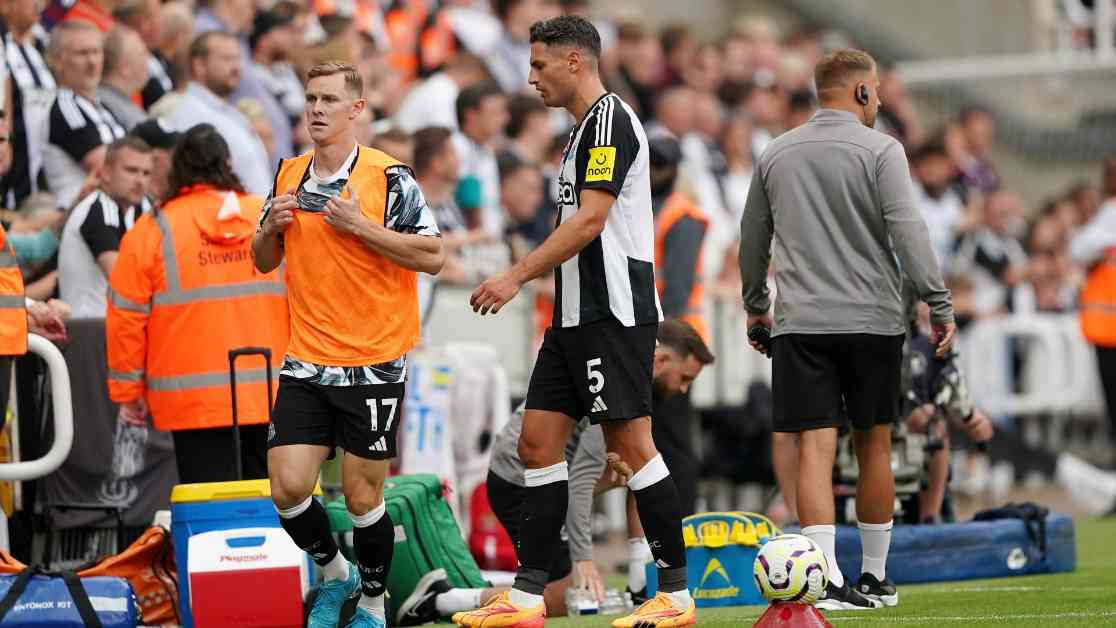Newcastle’s Season Opener Marred by Schar’s Red Card Headbutt
Newcastle United’s highly anticipated season opener against Southampton took a turn for the worse when Fabian Schar was sent off for a shocking headbutt on Southampton’s Brereton Diaz. The incident sparked a mass brawl between players from both teams, overshadowing what was supposed to be an exciting start to the Premier League campaign at St James’ Park.
The altercation occurred in the opening 30 minutes of the match, with a free kick being awarded on the halfway line. Schar was shoved over by Diaz after turning his back on a loose ball, prompting the Newcastle defender to react furiously. He shoved Diaz and then put his forehead on the Southampton striker, who fell to the ground clutching his face. As hordes of players from each team ran over to back their respective teammates, the situation quickly escalated.
A red card was immediately shown to Schar for his violent conduct, and a VAR check confirmed the decision. The Toon made a substitution, with Krafth coming on for Murphy in response to the red card. The incident not only marred Newcastle’s season opener but also set the tone for a heated and intense match between the two teams.
Impact on the Match
The red card shown to Schar had significant implications for Newcastle United’s performance in the match. Being reduced to 10 men early in the game put the team at a disadvantage both defensively and offensively. The loss of Schar, a key player in the squad, meant that the team had to readjust their tactics and formation to compensate for his absence on the field.
Moreover, the brawl that ensued as a result of Schar’s actions further disrupted the flow of the game and created a tense atmosphere on the pitch. The physical altercation between players not only reflected poorly on the sportsmanship of both teams but also raised concerns about player safety and discipline in professional football.
Despite the setback caused by Schar’s red card, Newcastle United showed resilience and determination in the face of adversity. The team rallied together to defend against Southampton’s attacks and tried to maintain a competitive edge despite being a man down. The match became a test of character for the players, as they had to demonstrate unity and composure in the midst of a contentious and emotionally charged situation.
Reactions and Fallout
The incident involving Fabian Schar’s red card and subsequent brawl sparked a wave of reactions from fans, pundits, and football experts alike. Many condemned Schar’s actions as reckless and unacceptable, highlighting the need for stricter disciplinary measures to deter such behavior in the future. The incident also reignited debates about the role of VAR in officiating matches and ensuring fair play on the field.
Both Newcastle United and Southampton issued statements in the aftermath of the incident, expressing their disappointment and disapproval of the unsportsmanlike conduct displayed by players during the match. The clubs emphasized the importance of upholding the values of respect and fair play in football and vowed to take appropriate action to address the incident internally.
The Football Association (FA) launched an investigation into the incident to determine if further disciplinary action was necessary for the players involved. The FA’s commitment to upholding the integrity of the game and enforcing strict disciplinary standards underscored the seriousness of the incident and its impact on the reputation of English football.
In conclusion, Fabian Schar’s red card headbutt and the ensuing brawl at Newcastle United’s season opener against Southampton highlighted the volatile nature of professional football and the importance of maintaining discipline and sportsmanship on the field. The incident served as a stark reminder of the consequences of reckless behavior and the need for players, coaches, and officials to uphold the highest standards of conduct in the sport. As both teams reflect on the events of the match, they are reminded of the responsibility they carry as representatives of their clubs and the game of football as a whole.

